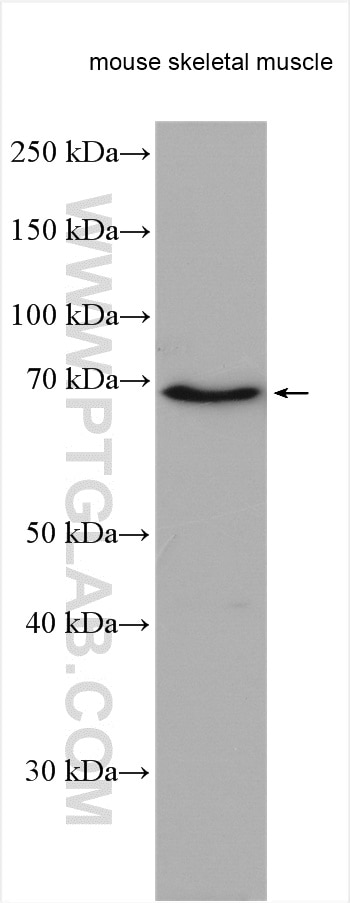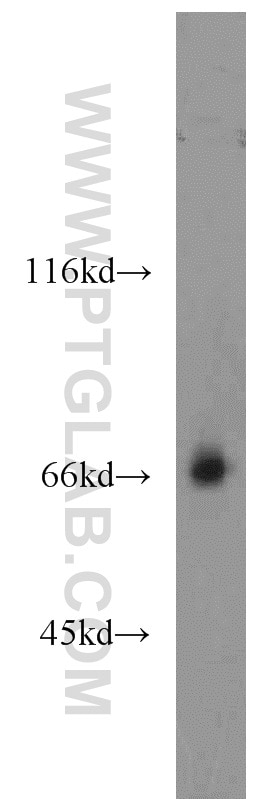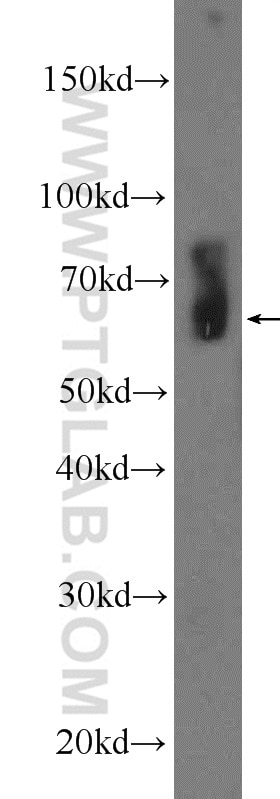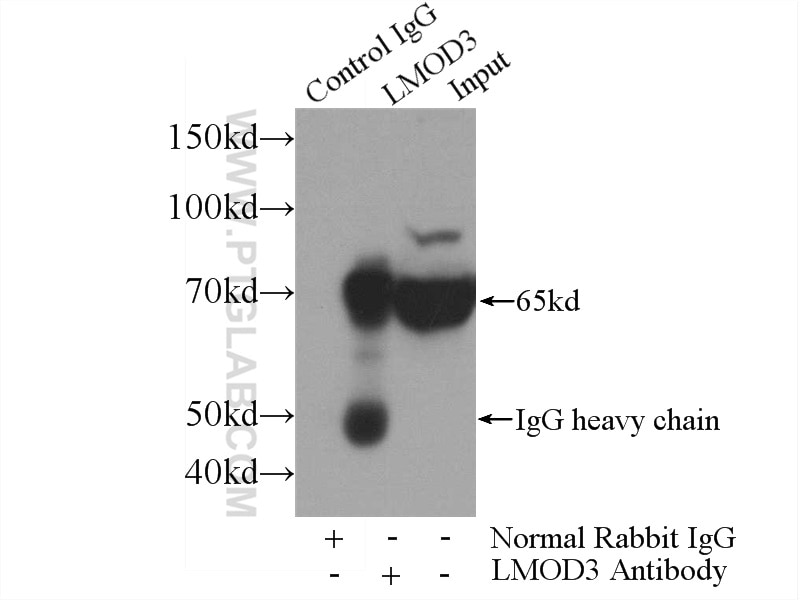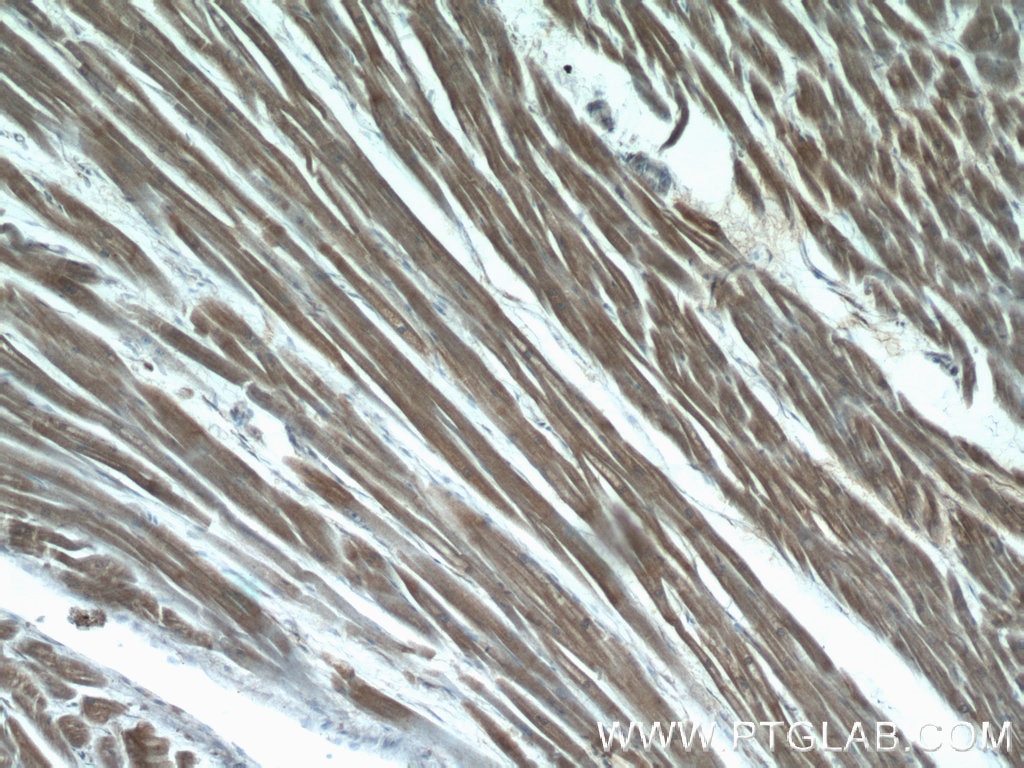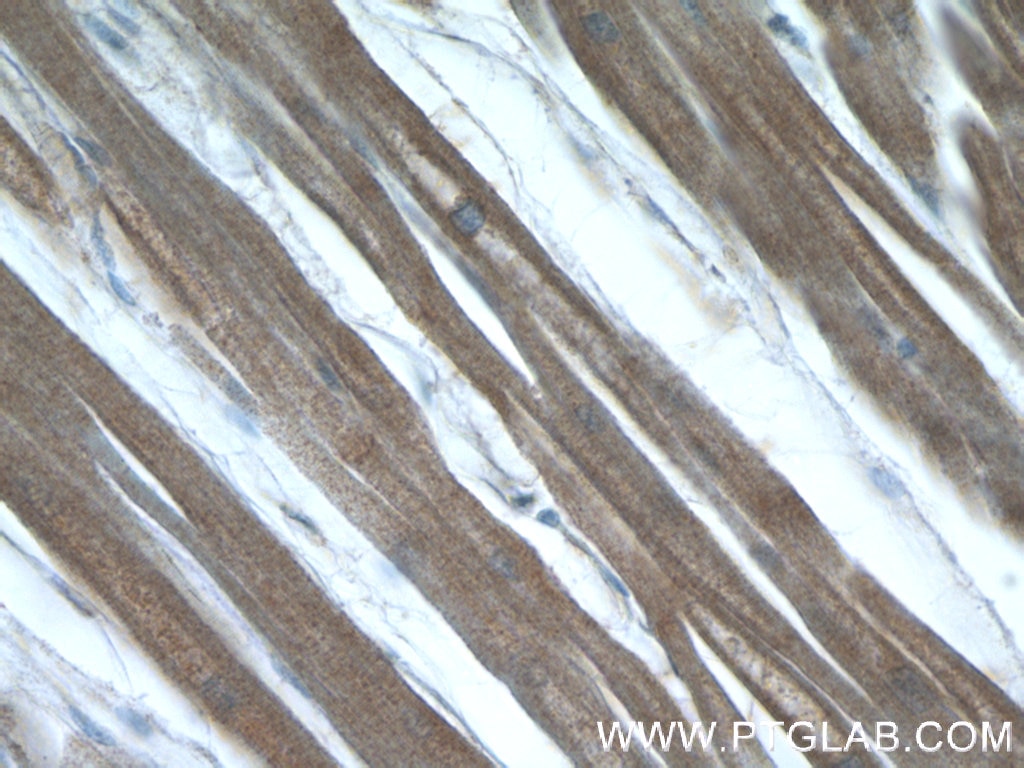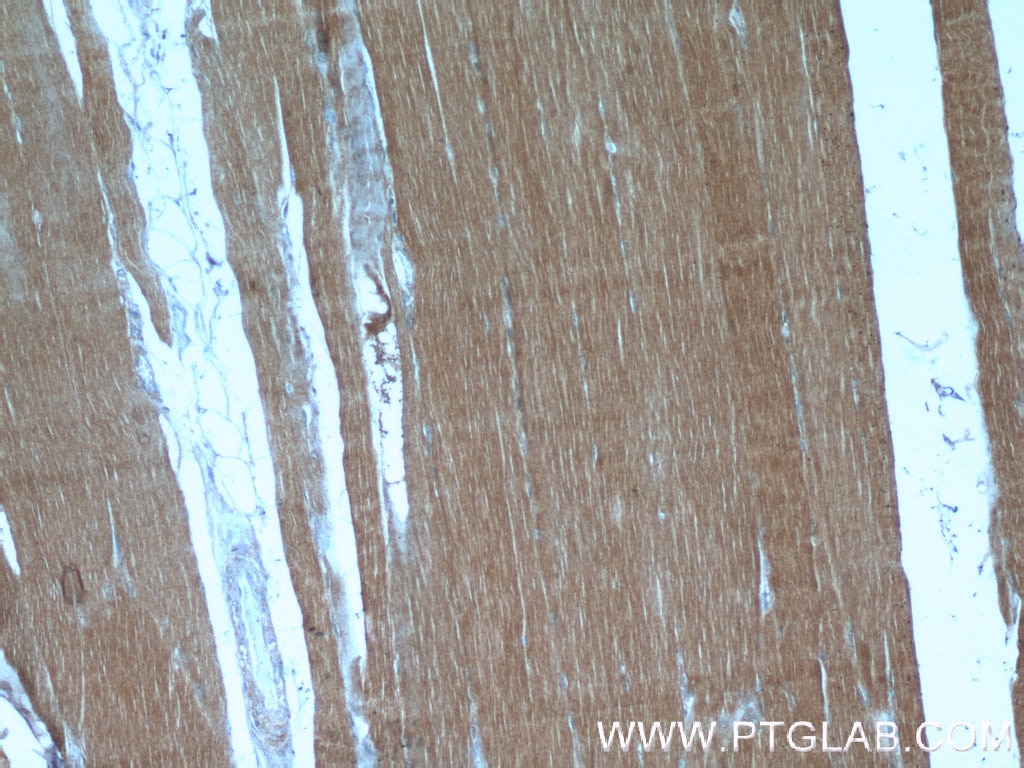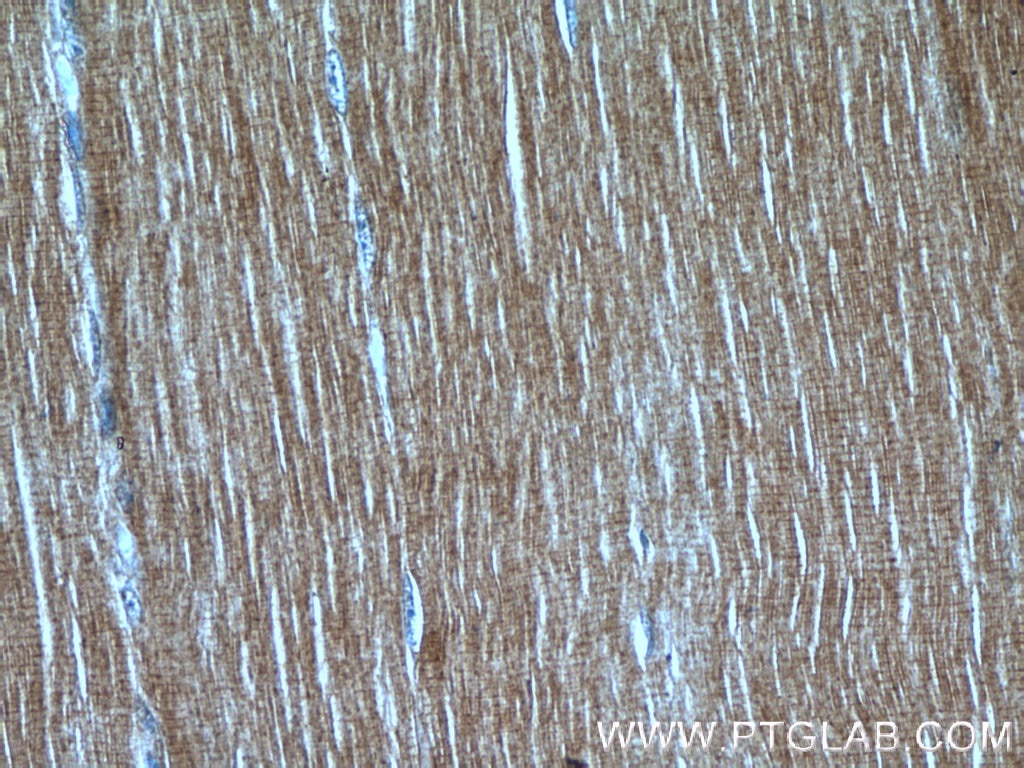- Phare
- Validé par KD/KO
Anticorps Polyclonal de lapin anti-LMOD3
LMOD3 Polyclonal Antibody for WB, IP, IHC, ELISA
Hôte / Isotype
Lapin / IgG
Réactivité testée
Humain, rat, souris et plus (2)
Applications
WB, IP, IF, IHC, ELISA
Conjugaison
Non conjugué
N° de cat : 14948-1-AP
Synonymes
Galerie de données de validation
Applications testées
| Résultats positifs en WB | tissu de muscle squelettique de souris, tissu cardiaque de souris, tissu de muscle squelettique de rat |
| Résultats positifs en IP | tissu de muscle squelettique de souris |
| Résultats positifs en IHC | tissu cardiaque humain, tissu de muscle squelettique humain il est suggéré de démasquer l'antigène avec un tampon de TE buffer pH 9.0; (*) À défaut, 'le démasquage de l'antigène peut être 'effectué avec un tampon citrate pH 6,0. |
Dilution recommandée
| Application | Dilution |
|---|---|
| Western Blot (WB) | WB : 1:2000-1:10000 |
| Immunoprécipitation (IP) | IP : 0.5-4.0 ug for 1.0-3.0 mg of total protein lysate |
| Immunohistochimie (IHC) | IHC : 1:20-1:200 |
| It is recommended that this reagent should be titrated in each testing system to obtain optimal results. | |
| Sample-dependent, check data in validation data gallery | |
Applications publiées
| KD/KO | See 2 publications below |
| WB | See 13 publications below |
| IHC | See 3 publications below |
| IF | See 5 publications below |
Informations sur le produit
14948-1-AP cible LMOD3 dans les applications de WB, IP, IF, IHC, ELISA et montre une réactivité avec des échantillons Humain, rat, souris
| Réactivité | Humain, rat, souris |
| Réactivité citée | Humain, poisson-zèbre, souris, xénope |
| Hôte / Isotype | Lapin / IgG |
| Clonalité | Polyclonal |
| Type | Anticorps |
| Immunogène | LMOD3 Protéine recombinante Ag6758 |
| Nom complet | leiomodin 3 (fetal) |
| Masse moléculaire calculée | 65 kDa |
| Poids moléculaire observé | 65-70 kDa |
| Numéro d’acquisition GenBank | BC039202 |
| Symbole du gène | LMOD3 |
| Identification du gène (NCBI) | 56203 |
| Conjugaison | Non conjugué |
| Forme | Liquide |
| Méthode de purification | Purification par affinité contre l'antigène |
| Tampon de stockage | PBS avec azoture de sodium à 0,02 % et glycérol à 50 % pH 7,3 |
| Conditions de stockage | Stocker à -20°C. Stable pendant un an après l'expédition. L'aliquotage n'est pas nécessaire pour le stockage à -20oC Les 20ul contiennent 0,1% de BSA. |
Informations générales
The gene encoding LMOD3 has not been characterized so far and very limited information of its function has been reported. Nanda et al. found that the expression of mouse LMOD3 mRNA is restricted largely to cardiac and skeletal muscle through RT-PCR analysis (PMID: 22157009). Two isoforms of LMOD3 may exist due to the alternative splicing, whose molecular weights are predicted as 65 kDa and 40 kDa, respectively (Uniprot). This antibody was raised against the N-terminal region of human LMOD3. It detects a double bands around 80 kDa and 65 kDa in heart and skeletal muscle lysates. The reason causing the discrepancy between the predicted and observed molecular weight is not clear.
Protocole
| Product Specific Protocols | |
|---|---|
| WB protocol for LMOD3 antibody 14948-1-AP | Download protocol |
| IHC protocol for LMOD3 antibody 14948-1-AP | Download protocol |
| IP protocol for LMOD3 antibody 14948-1-AP | Download protocol |
| Standard Protocols | |
|---|---|
| Click here to view our Standard Protocols |
Publications
| Species | Application | Title |
|---|---|---|
Sci Adv Nebulin and Lmod2 are critical for specifying thin-filament length in skeletal muscle. | ||
J Clin Invest Leiomodin-3 dysfunction results in thin filament disorganization and nemaline myopathy. | ||
J Clin Invest Severe myopathy in mice lacking the MEF2/SRF-dependent gene leiomodin-3.
| ||
J Clin Invest Leiomodin-3 dysfunction results in thin filament disorganization and nemaline myopathy. | ||
J Clin Invest KLHL40 deficiency destabilizes thin filament proteins and promotes nemaline myopathy. | ||
Proc Natl Acad Sci U S A HSPB7 is indispensable for heart development by modulating actin filament assembly. |
Avis
The reviews below have been submitted by verified Proteintech customers who received an incentive forproviding their feedback.
FH Tongbin (Verified Customer) (08-25-2020) | This antibody is very specific. I had a single Lmod3 band at around 70kD. Western blot results of this antibody had been published in our PNAS paper (PMID: 29078393)
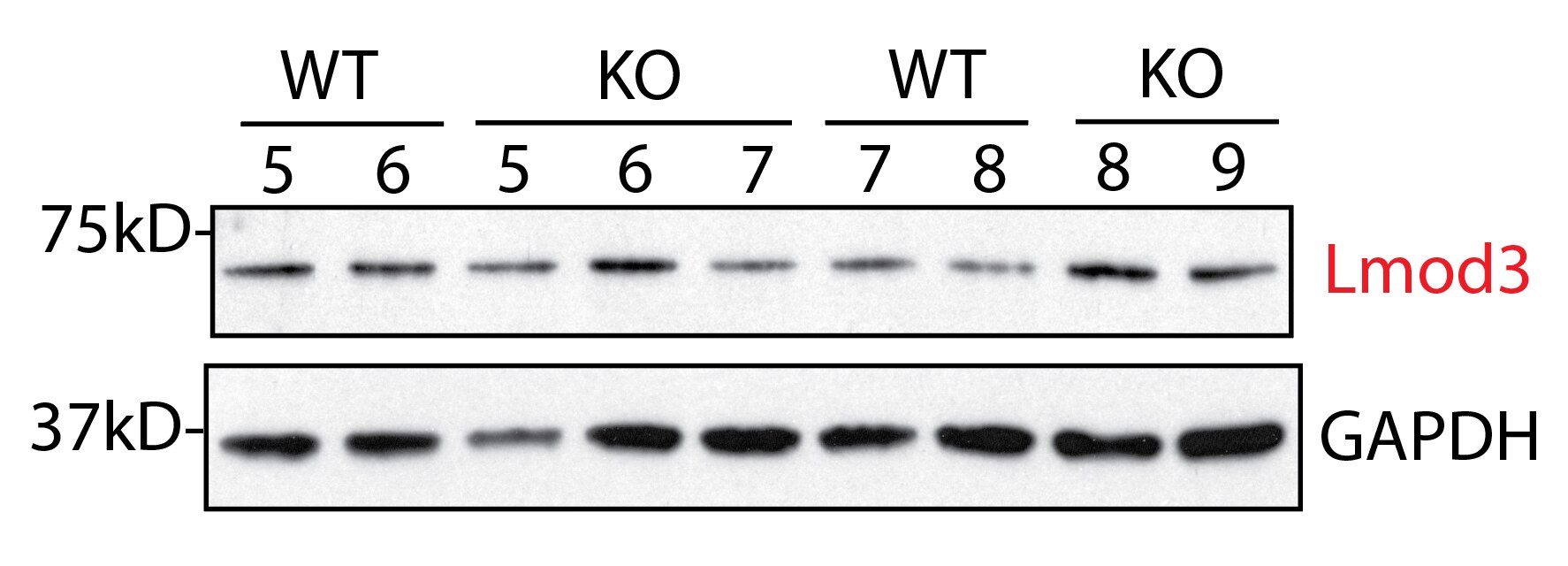 |
